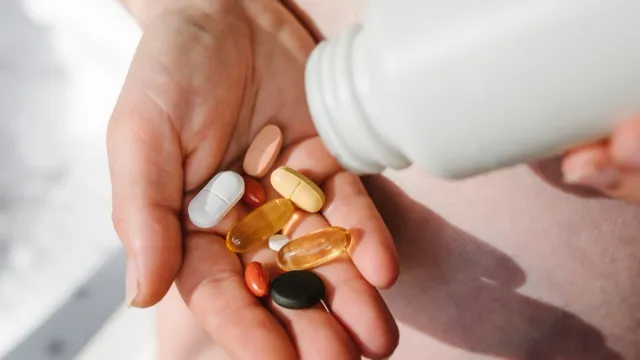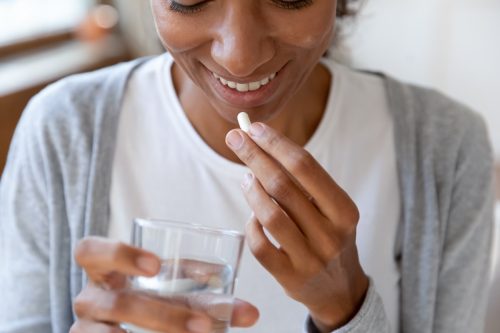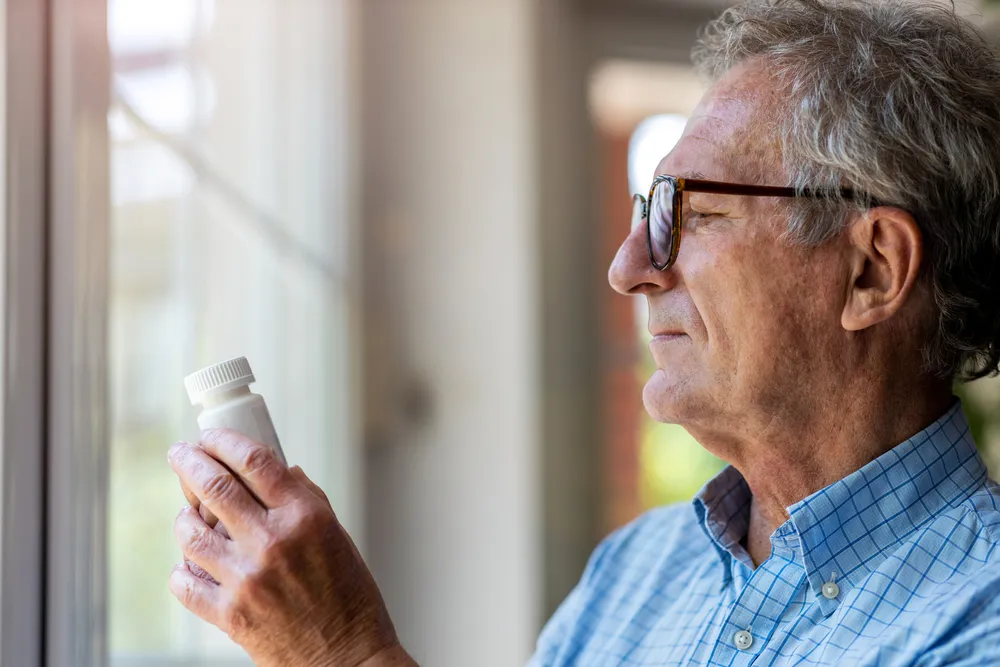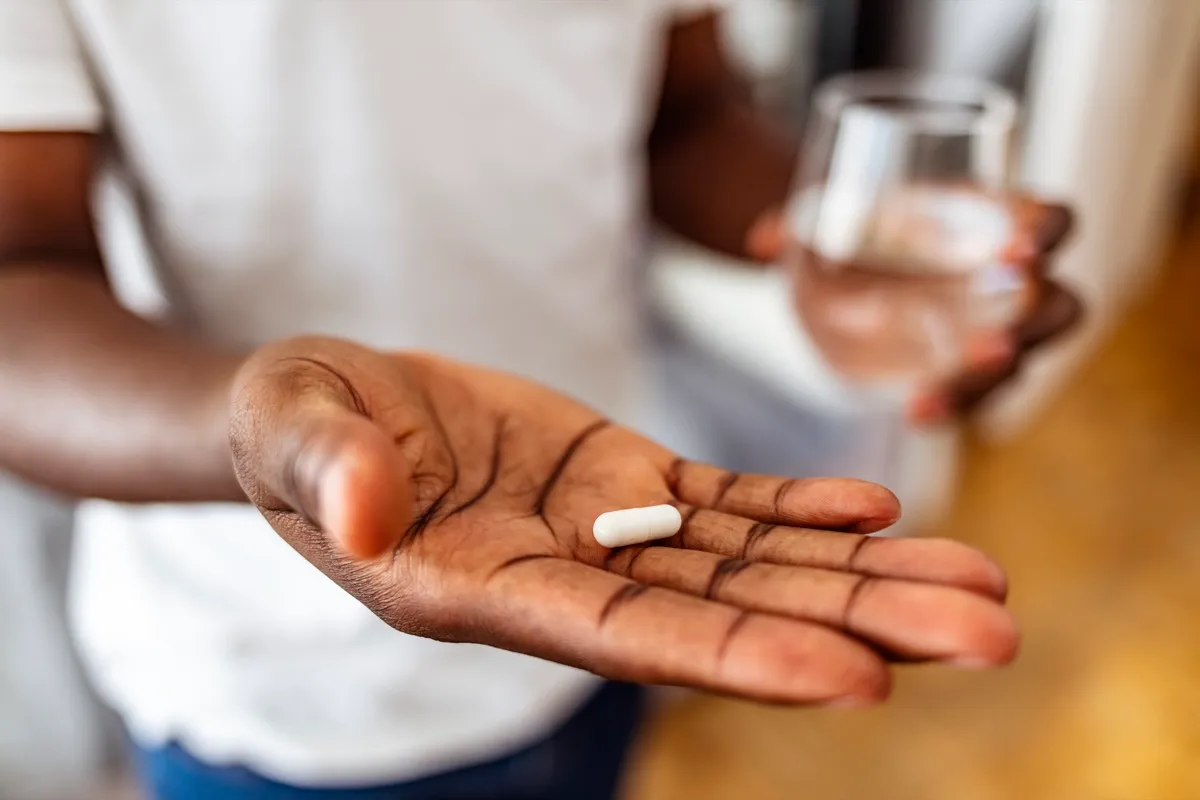5 Best Anti-Aging Supplements, According to a Doctor

Your age is about more than how many trips you’ve taken around the sun. Yes, your chronological age represents how many years you’ve lived. However, there’s a second way to measure aging: biological age, or how old your cells are based on your health. Experts say that certain interventions, including anti-aging supplements, can help you reduce your biological age, essentially turning back the clock. This could translate into a longer health span, or the number of years you’ll spend healthy and disease-free.
That’s why we spoke to Kien Vuu, MD, a triple board-certified physician and the founder of Vuu MD Performance and Longevity, to find out which supplements are best for fighting premature aging. He’s identified his “five to thrive”—five supplements that he says are breaking down barriers in anti-aging research.
“The journey towards longevity is about enriching the quality of life at every stage. As we continue to uncover aging secrets, let’s remain proactive and open to the innovative solutions that 2024 and beyond offer,” he says. Read on to find out which five anti-aging supplements are the ones to watch this year.
RELATED: People Who Live to 100 Have These 3 Things in Common, New Research Shows.
5 Best Anti-Aging Supplements
1. Urolithin A

Urolithin A isn’t found in dietary sources, but it can be produced in the gut after eating foods like nuts, berries, pomegranates, and muscadine grapes. Vuu says it has powerful anti-aging properties that can help repair your cells.
“A byproduct of gut bacteria metabolizing ellagitannins, Urolithin A is gaining attention for its ability to rejuvenate mitochondria, the powerhouses of our cells,” Vuu explains. “It promotes mitophagy, helping to recycle damaged mitochondria, which is crucial for maintaining cellular vitality. Its promising effects on muscle strength and mitochondrial health, especially in aging populations, make Urolithin A a top supplement.”
2. Nicotinamide Mononucleotide (NMN)

Most people haven’t heard of NAD+ levels, but they’re an important aspect of cellular health.
“Nicotinamide adenine dinucleotide (NAD+) is an important cofactor in all living cells that is involved in fundamental biological processes, namely metabolism, cell signalling, gene expression, DNA repair, among others,” explains a 2018 study published in the journal Translational Medicine of Aging.
“NAD+ depletion has been associated with hallmarks of aging and may underlie a wide-range of age-related diseases, such as metabolic disorders, cancer and neurodegenerative diseases,” the researchers write.
Therefore, Vuu recommends the supplement Nicotinamide Mononucleotide (NMN) for anti-aging, since it can help to restore your NAD+ to a higher level as they decline with age.
“Elevating NAD+ can enhance energy metabolism and counteract age-related physiological decline,” he shares. “NMN’s impact on various body systems makes it an exciting supplement for those focused on holistic aging.”
However, it is important to note that the Food and Drug Administration (FDA) recently decided that “because it is under investigation by pharmaceutical companies as a potential new drug,” NMN cannot be marketed or sold in the U.S. as a dietary supplement, according to Healthnews.
Nicotinamide Riboside (NR) is a similar supplement that is readily available in the U.S.
RELATED: 7 Surprising Benefits of Taking Magnesium Every Day.
3. Spermidine

Next, Vuu says that spermidine, a naturally occurring polyamine, has recently come under the spotlight for its potential to prolong life span and improve health span.
In fact, according to a 2023 study in Scientific Reports, the normal aging process has been found to reduce naturally occurring spermidine concentrations in the body. “That is not observed in centenarians, which show a relatively high concentration of spermidine,” the study states.
Vuu says that’s where supplements come in. “It’s believed to promote autophagy, a critical cellular renewal process linked to cardiovascular health and cognitive function. Spermidine’s broad cellular benefits make it a compelling addition to anti-aging regimens,” he explains.
4. Fisetin

Senescent cells are those that have begun deteriorating with age, releasing inflammatory molecules into the surrounding tissues. Senolytics are drugs or supplements that are used to eliminate those senescent cells, helping to delay or prevent age-related illnesses.
“Fisetin is gaining traction for its senolytic properties and the ability to clear out senescent cells that contribute to aging and age-related diseases,” Vuu explains. “By reducing the accumulation of these dysfunctional cells, Fisetin can significantly impact the aging process and enhance overall health.”
RELATED: Doctors Reveal Their 6 Best-Kept Longevity Secrets.
5. Curcumin

Last but not least, curcumin supplements are believed to fight aging by reducing oxidative stress and inflammation, ultimately improving heart health, brain health, and more.
“The active compound in turmeric, curcumin, is renowned for its anti-inflammatory and antioxidant properties,” says Vuu. “As chronic inflammation plays a crucial role in aging, curcumin’s ability to mitigate these processes positions it as a valuable supplement in anti-aging strategies.”
The physician emphasizes that while these supplements represent exciting frontiers in the quest for longevity, you should always consult a healthcare professional before starting any new supplement to ensure it aligns with your health needs and goals.
“Embracing a holistic approach, combining these supplements with a healthy lifestyle is essential for maximizing their benefits,” he says.
CORRECTION: An earlier version of this post omitted information about NMN’s availability in the U.S. We regret the error.
For more health advice sent directly to your inbox, sign up for our daily newsletter.
Best Life offers the most up-to-date information from top experts, new research, and health agencies, but our content is not meant to be a substitute for professional guidance. When it comes to the medication you’re taking or any other health questions you have, always consult your healthcare provider directly.
- Source: Translational Medicine of Aging
- Source: Scientific Reports
- Source: Molecules